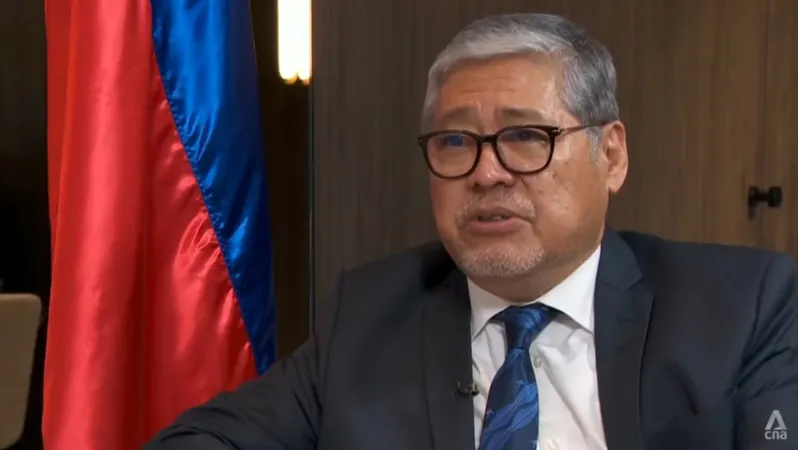
Philippines Stands Firm on Sovereignty Amid South China Sea Tensions: A Diplomatic Approach with Backbone
2025-01-10
Author: Wei
Philippines Stands Firm on Sovereignty Amid South China Sea Tensions: A Diplomatic Approach with Backbone
SINGAPORE – In a bold assertion of its national rights, the Philippines has reiterated its commitment to navigate the escalating maritime tensions with China through diplomacy, while steadfastly defending its territorial sovereignty. Foreign Affairs Secretary Enrique Manalo has emphasized Manila’s intention to pursue peaceful resolutions aligned with international law, maintaining that discussions on tension management will never come at the expense of the Philippines' sovereign rights.
“The Philippines is dedicated to addressing any incidents or disputes with China through dialogue and cooperation. However, our commitment to sovereignty is non-negotiable,” Manalo declared. This statement comes amid a backdrop of increasing confrontations in the contested waters of the South China Sea, which the Philippines refers to as the West Philippine Sea.
Ties have soured significantly between the two nations over the past few years, characterized by a series of maritime confrontations that have raised alarms both regionally and internationally. Manila has vocally condemned what it perceives as aggressive actions and incursions by Chinese vessels, while China, in turn, accuses the Philippines of entering its waters unlawfully.
China’s sweeping claims over the South China Sea, which overlap the Philippines' exclusive economic zone (EEZ), have further complicated matters. The EEZ, which extends 200 nautical miles from a nation's coastline, allows countries exclusive rights to explore and utilize marine resources.
“Our activities within our EEZ are legal and are anchored in the United Nations Convention on the Law of the Sea,” Manalo stated. “We are simply asserting our rights, and we hope for their respect.”
Bilateral Issues Over US Influence
Manalo observed that China often interprets the tensions between the Philippines and Beijing as a reflection of the broader United States-China rivalry, a viewpoint that he believes hampers the potential for improved relations. “The actions we are taking in our EEZ are not driven by the US; rather, they stem from our desire to uphold our legal rights as a nation,” he affirmed.
Since early 2023, the Philippines has adopted a strategy of "assertive transparency," exposing Chinese incursions and aggressive actions directed at Filipino fisherfolk and vessels. This approach is aimed at raising international awareness and showcasing the reality of the situation.
“We are merely exercising our legal rights, not instigating conflicts,” Manalo explained. “Our actions are often simply attempts to resupply our troops or assist local fishermen, yet they have faced harassment and intimidation.”
Military Modernization and Regional Implications
As tensions in the region continue, the Philippines is actively pursuing military modernization to safeguard its maritime interests. Last month, the country announced plans to procure the US Typhon missile system, a step that has drawn criticism from China, which warns that such moves may exacerbate regional arms races. The acquisition process is projected to span at least two years.
Manalo clarified that the Philippine military upgrades aim to enhance defense capabilities without aggressive intentions. “We are dedicated to maintaining peace in the region, and these enhancements are simply for our defensive preparedness,” he emphasized.
Looking Ahead: Philippine-US Relations Under Trump
As the US prepares for a new presidential era under Donald Trump, Manalo expressed optimism regarding continued strong relations between the Philippines and the United States. Following Trump's election, President Ferdinand Marcos Jr. reached out to discuss mutual interests, solidifying hopes for a robust partnership.
“Our long-standing ties will likely remain strong. The collaboration between our nations has historically included various sectors, from military to economic cooperation,” Manalo noted.
Reflecting on past engagements during Trump's previous presidency, he recalled the high point of US-Philippine relations between 2017 and 2021, marked by a significant military partnership. The mutual defense treaty has been a cornerstone of the alliance, reinforcing the commitment between the two nations that has stood for over 75 years.
As the Philippines navigates the turbulent waters of diplomacy and national interests, its clear stance on sovereignty promises to shape the future of its relations both with China and its long-time ally, the United States. With the South China Sea tensions far from resolved, the world watches closely.



 Brasil (PT)
Brasil (PT)
 Canada (EN)
Canada (EN)
 Chile (ES)
Chile (ES)
 Česko (CS)
Česko (CS)
 대한민국 (KO)
대한민국 (KO)
 España (ES)
España (ES)
 France (FR)
France (FR)
 Hong Kong (EN)
Hong Kong (EN)
 Italia (IT)
Italia (IT)
 日本 (JA)
日本 (JA)
 Magyarország (HU)
Magyarország (HU)
 Norge (NO)
Norge (NO)
 Polska (PL)
Polska (PL)
 Schweiz (DE)
Schweiz (DE)
 Singapore (EN)
Singapore (EN)
 Sverige (SV)
Sverige (SV)
 Suomi (FI)
Suomi (FI)
 Türkiye (TR)
Türkiye (TR)
 الإمارات العربية المتحدة (AR)
الإمارات العربية المتحدة (AR)